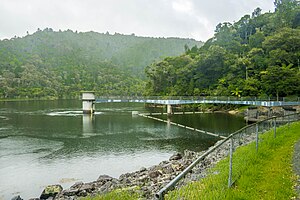Whau Valley
Whau Valley | |
|---|---|
 Whau Valley earth dam | |
 | |
| Coordinates: 35°41′55″S 174°18′46″E / 35.69861°S 174.31278°E | |
| Country | New Zealand |
| City | Whangārei |
| Local authority | Whangarei District Council |
| Electoral ward | Whangārei Urban Ward |
| Area | |
| • Land | 718 ha (1,774 acres) |
| Population (June 2024)[2] | |
| • Total | 2,880 |
| Postcode(s) | 0112 |
| Kamo | Otangarei | |
|
|
Mairtown | |
| (Pukenui Forest) | Regent | Kensington |
Whau Valley is a suburb of Whangārei, in Northland Region, New Zealand. State Highway 1 runs through it.[3] The valley was named for the whau trees which grew there in the 1850s.[4]
At the end of the 4 km long Whau Valley Road is the principal water reservoir for Whangārei City, created by the Whau Valley Earth Dam. The reservoir is stocked with rainbow and brown trout.[5][6]
History
[edit]Some of the early settlers in what was then called Whauwhau Valley were William Hawken and his family, who arrived in 1859, and John MacDonald and his family, in 1860. The MacDonald family was part of the group of people from Nova Scotia who settled in the Whangārei area.[7]
Coal was discovered in the Whauwhau Valley on 24 August 1864.[8] Henry Walton and William Grahame took a 99-year lease on the land and developed a mine. A wooden tramway was built from the mine to the Hātea River so coal wagons could be pulled by horses to be loaded onto ships. The railway line between Kamo and Whangārei, opened in March 1881,[9] replaced the tramway. Output of the mine was 45,359 long tons (46,087 t) by 1885.[10]
Demographics
[edit]Whau Valley covers 7.18 km2 (2.77 sq mi)[1] and had an estimated population of 2,880 as of June 2024,[2] with a population density of 401 people per km2.
| Year | Pop. | ±% p.a. |
|---|---|---|
| 2006 | 2,601 | — |
| 2013 | 2,538 | −0.35% |
| 2018 | 2,799 | +1.98% |
| Source: [11] | ||
Whau Valley had a population of 2,799 at the 2018 New Zealand census, an increase of 261 people (10.3%) since the 2013 census, and an increase of 198 people (7.6%) since the 2006 census. There were 1,044 households, comprising 1,308 males and 1,491 females, giving a sex ratio of 0.88 males per female. The median age was 44.4 years (compared with 37.4 years nationally), with 510 people (18.2%) aged under 15 years, 480 (17.1%) aged 15 to 29, 1,140 (40.7%) aged 30 to 64, and 669 (23.9%) aged 65 or older.
Ethnicities were 77.5% European/Pākehā, 26.2% Māori, 3.8% Pacific peoples, 7.3% Asian, and 2.5% other ethnicities. People may identify with more than one ethnicity.
The percentage of people born overseas was 18.6, compared with 27.1% nationally.
Although some people chose not to answer the census's question about religious affiliation, 45.9% had no religion, 41.7% were Christian, 1.0% were Hindu, 0.4% were Buddhist and 2.8% had other religions.
Of those at least 15 years old, 411 (18.0%) people had a bachelor's or higher degree, and 495 (21.6%) people had no formal qualifications. The median income was $25,500, compared with $31,800 nationally. 321 people (14.0%) earned over $70,000 compared to 17.2% nationally. The employment status of those at least 15 was that 972 (42.5%) people were employed full-time, 315 (13.8%) were part-time, and 120 (5.2%) were unemployed.[11]
Education
[edit]Whau Valley School is a contributing primary (years 1-6) school with a roll of 331 students as of August 2024.[12][13]
St Francis Xavier School is a Catholic contributing primary (years 1-6) school with a roll of 498 students as of August 2024.[12][14]
Whangarei Adventist Christian School is a full primary (years 1-8) school with a roll of 33 students as of August 2024.[12][15]
All these schools are coeducational. St Francis Xavier and Whangarei Adventist schools are state integrated.
Notes
[edit]- ^ a b "ArcGIS Web Application". statsnz.maps.arcgis.com. Retrieved 18 April 2022.
- ^ a b "Aotearoa Data Explorer". Statistics New Zealand. Retrieved 26 October 2024.
- ^ Roger Smith, GeographX (2005). The Geographic Atlas of New Zealand. Robbie Burton. pp. map 24. ISBN 1-877333-20-4.
- ^ Pickmere, Nancy Preece (1986). Whangarei: The Founding Years. p. 70.
- ^ Parkes, W. F. (1992). Guide to Whangarei City and District. p. 54. ISBN 0-473-01639-7.
- ^ "Northland Fishing". Fish & Game New Zealand. Retrieved 8 May 2008.
- ^ Pickmere, 69-70
- ^ "Auckland: Discovery of Coal". Press. 12 September 1864. p. 2.
- ^ "Official opening on Kamo Railway". Auckland Star. 4 March 1881. p. 2. Retrieved 29 September 2023.
- ^ Pickmere, pp 56, 144
- ^ a b "Statistical area 1 dataset for 2018 Census". Statistics New Zealand. March 2020. Whau Valley (106100). 2018 Census place summary: Whau Valley
- ^ a b c "New Zealand Schools Directory". New Zealand Ministry of Education. Retrieved 17 September 2024.
- ^ Education Counts: Whau Valley School
- ^ Education Counts: St Francis Xavier School
- ^ Education Counts: Whangarei Adventist Christian School
